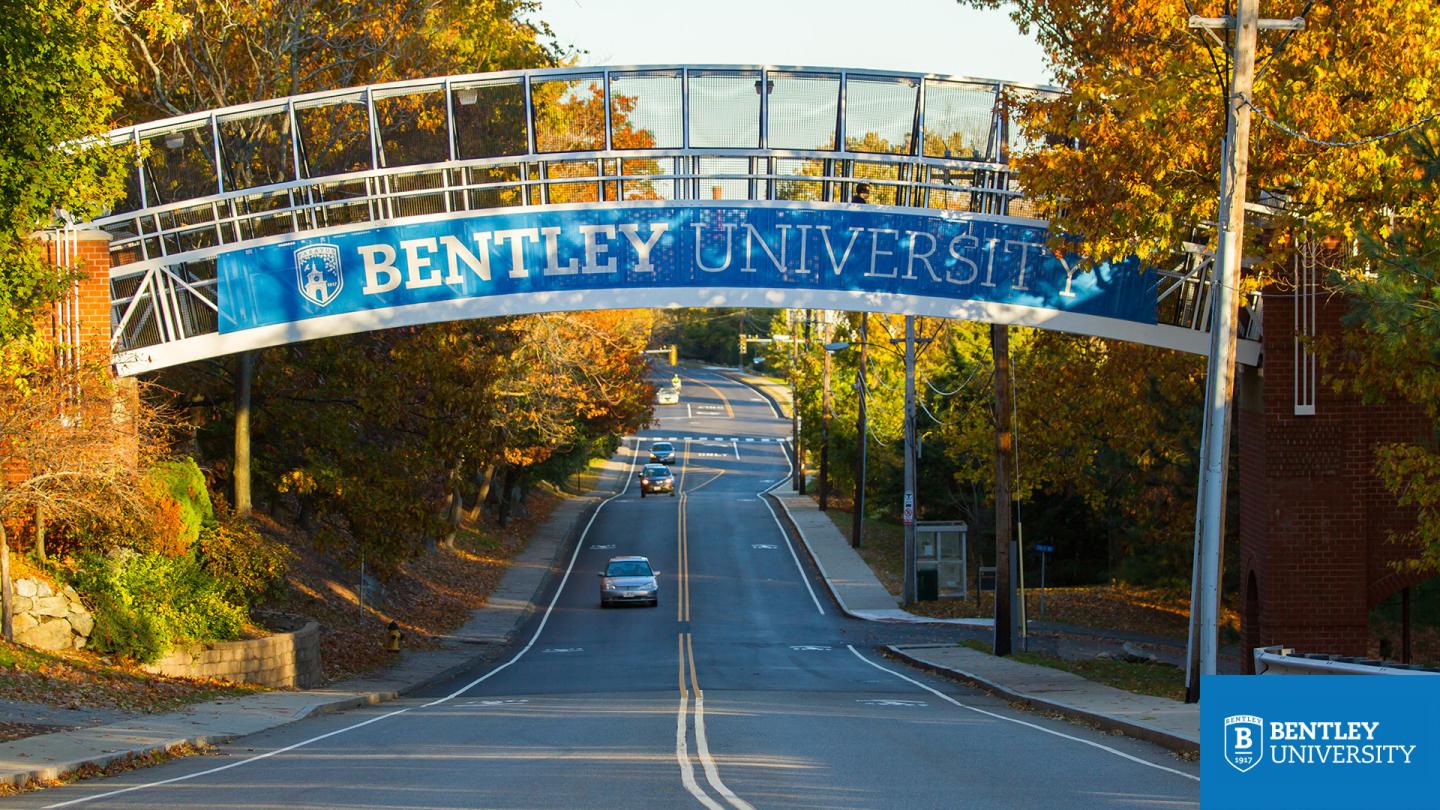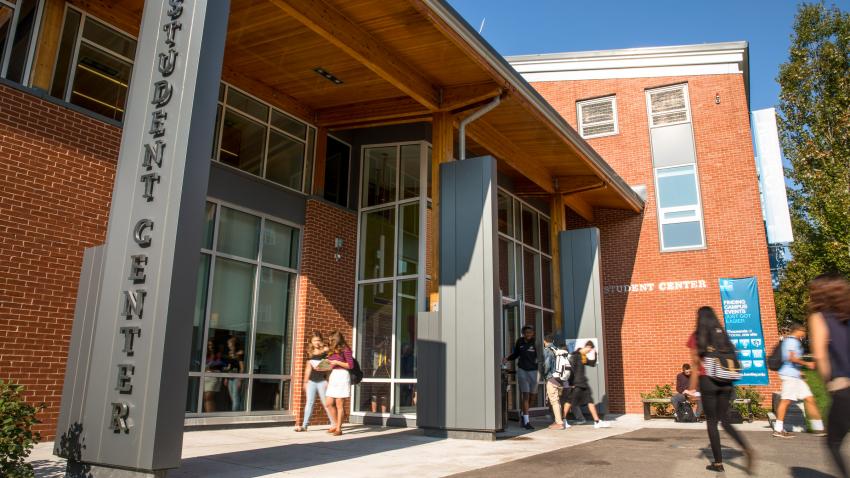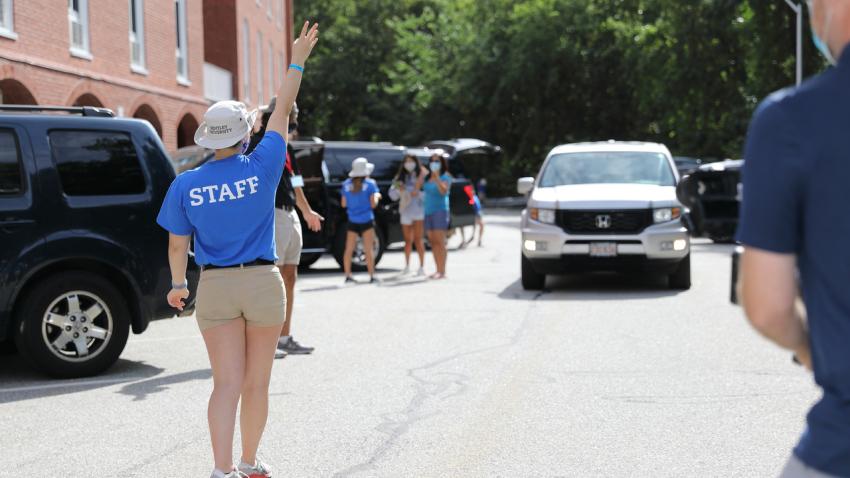Conduct System
The Bentley University conduct system is designed to address student behavior, provide proactive initiatives, support a safe and stimulating campus climate, and educate students via individual meetings, group meetings, board hearings, as well as through the delivery of holistic sanctioning.
Faculty, staff, students, and students' families can always contact the Office of Student Conduct staff with questions or concerns.
Restorative Justice
The Conduct philosophy and subsequent processes are modeled after the spirit of Restorative Justice. Restorative justice seeks to examine the harmful impacts of a decision and then determines the opportunities to repair the harm while holding the person who caused it accountable. At Bentley, we believe that students are responsible for their actions and the harm they cause to themselves, others, and the community, regardless of intent. Our Conduct processes are created to provide an educational opportunity to students who violate campus policies. Students will be able to reflect on their behavior, learn from their experiences, understand the impact of any harm they caused, and be provided opportunities to restore the harm while being held accountable for their actions.
Learn more about Restorative Justice
Referral and Reporting Links
Helpful Resources
Office of Student Conduct (General Information)
Professional Staff contacts:
Melissa Henriquez, Assistant Director of Student Conduct & Development
781.891.2069 | mhenriquez@bentley.edu
Liz Humphries, Director of Student Development, Conduct, and Care
781.891.2225 | ehumphries@bentley.edu
General Office of Student Conduct contact information:
Email: GA_StudentConduct@bentley.edu Phone: 781-891-2161
- Identify the behavior they engaged in and why it is a violation of University policy.
- Implicit in this outcome, why is the institution concerned about student behavior?
- Examine the impact and consequences of their behavior on self and the community.
- Implicit in this outcome, does the student understand how future incidents will impact their standing as a student?
- Recognize their personal responsibility in their actions and behavior, and articulate alternative strategies to prevent negative consequences in the future.
- Implicit in this outcome, how do these actions reflect the students personal beliefs and values?
The Bentley University student conduct process is designed to address student behavior, provide proactive initiatives, support a safe and stimulating campus climate and educate students via individual meetings, group meetings, board hearings and through the delivery of holistic sanctioning. The philosophy of the Bentley University Conduct System is based on the belief that:
- Students are responsible for their individual actions as well as for the way the community functions as a whole.
- When students can learn from their experiences, receive help from the university, constructively examine their behavior and take positive steps toward changing that behavior, the proper conduct response should be educational in nature.
- When students become involved in behavior that violates the spirit and/or substance of federal, state, or local law or Bentley rules, regulations, policies and procedures basic to the welfare of the university community at large or the individual therein, the university is bound to take disciplinary action that modifies, restricts or denies the student’s status as a member of the university.
The Bentley Conduct System affirms and protects the right of every member of the community to:
- Be free from physical and psychological harassment based upon gender, sexual orientation, race, color, religion, nationality, ethnicity, disability status, veteran status or age.
- Study, sleep and socialize in a clean, well-kept, and safe environment.
- Focus on academics and be free from anything that may disrupt the academic environment.
Student Conduct Assistants (SCAs) are student employees in the Office of Student Development, Conduct, and Care. SCAs are well-trained and experienced within the OSDCC as they help to staff the front desk in STU 320, serve on the Student Conduct Board, and support all initiatives within the Office of Student Conduct. SCAs facilitate Pre-Administrative Hearing Meetings and represent the Office of Student Development, Conduct, and Care in many other capacities.
Application Timeline (Spring 2023)
- Week of March 20th: Application available to students
- April 6th at 4PM: Application closes
- Week of April 6th: Begin interviews
- Week of April 17th: Decisions sent to candidates
If positions are available, they will be posted on Workday for students to apply. SCA job description is available below.
There are two conduct processes within the conduct system: Administrative Hearing Process and the Student Conduct Board Process.
Additional information about the conduct process:
Student organizations are defined as but not limited to: Recognized student organizations, registered with Student Programs & Engagement Organizations
If the conduct of members of a student organization violates a campus policy (on or off-campus) or results in an off-campus citation, the student organization is subject to referral to the Student Conduct System. The incident will be referred to the Office of Student Conduct for review, and if necessary, for resolution. During that period of review and/ or resolution, the Office of Student Conduct, in consultation with Student Programs & Engagement, reserves the right to implement an Interim Suspension or other form of interim measure to an organization. The student organization retains the same rights and responsibilities as an individual student in the university conduct process. The Office of Student Conduct will determine if a student organization participates in the Administrative Hearing process or Student Conduct Board Hearing process. A student organization is responsible for supervising all organization sponsored events on or off campus, even though other security measures may be taken. If a student organization is found to be responsible for violating university policies, rules, regulations and/or federal state or local laws, sanctions such as loss of privileges and/or recognition may be imposed. State and federal privacy laws do not apply to student organizations.
If a student organization demonstrates one or more of the behaviors below, the Office of Student Conduct may refer the student organization to the Student Conduct System:
- The conduct is endorsed by the student organization or any of its officers including, but not limited to, active or passive consent or support, having prior knowledge that the conduct was likely to occur and not taking any substantive action to prevent it (e.g., canceling the event, notifying the Office of Student Conduct, Student Programs & Engagement, University Police or local police, etc.), or helping to plan, advertise, or promote the conduct.
- The conduct is committed during an activity paid for by the organization, or paid for as a result of one or more members of the organization contributing personal funds in lieu of or in addition to organizational funds to support the activity or conduct in question.
- The conduct occurred on property currently owned, controlled, rented, leased, or used by the organization or any of its members for an organizational event. To determine organizational affiliation, historical property information may be used in the investigation process.
- The purpose of the activity was related to recruitment, initiation, admission into, affiliation with, or as a condition for continued membership in the organization.
- Non-members of the organization learned of the activity through members, advertisements, or communications associated with the organization, or otherwise formed a reasonable belief that the conduct or activity was affiliated with or endorsed by the organization.
- Members of the organization attempted to conceal the activity of other members who were involved.
- One or more officer(s) of the organization had prior knowledge or reasonably should have known that the conduct would take place.
- Whether the alleged incident occurred at or in connection with an organization-sponsored event or activity or at an event or activity that would reasonably be associated with the student organization.
- A significant percentage, as determined by the Office of Student Conduct, of the student organization was present during the time of the violation.
- Violate University policies, rules and regulations, federal and state or local laws, on or off campus.
It is important to note that when a student is a member of a recognized student organization, a student organization and the student(s) who contributed to the violation may be held collectively and individually responsible for violations of the Bentley Student Handbook. Therefore, a student may go through a student conduct process as an individual and as a member of a student organization, simultaneously. Student organizations may be held accountable for violations without regard to whether members of such organizations are individually held accountable for the same misconduct.
Interim Measures
The Office of Student Conduct, in collaboration with Student Programs and Engagement, may issue interim measures pending consideration of the conduct case. Interim measures may include but are not limited to: an order for the organization to suspend all activities and operations, no contact orders, and loss of privileges. The need for appropriate interim measures will vary between cases and will be communicated to the officers of the student organization. Failure to abide by interim measures is an additional violation of campus policy.
Conduct Process
A student organization will be represented by all officers during the conduct process. Officers will be required to attend mandatory conduct hearings. The Office of Student Conduct will inform the officers of a student organization if they will participate in the Administrative Hearing process or Student Conduct Board process. The conduct process for a student organization may include an investigation involving Bentley University Police or other Police departments depending on the location and nature of the incident.
Additional Information:
- The Office of Student Conduct will determine appropriate charges/violations and level of the conduct case.
- Student organizations have the same rights as individual students during an administrative hearing or student conduct board process. State and federal privacy laws do not apply to student organizations.
- If a student organization is affiliated with a national or international organization, the Office of Student Conduct and/or Student Programs and Engagement may notify the national/international office at any time. The Office of Student Conduct and/or notifying office may attempt to work in partnership with the national/international office.
- The full range of sanctions may be imposed on a student organization.
- The appeals process will be determined by the level of the conduct case.
When the Office of Student Conduct receives a report of an alleged violation, a case is created and referred to one of three conduct levels. The level at which the case will be heard is determined by the seriousness of the alleged violation(s) and the conduct history of the student. Once the case is assigned to a level, the Office of Student Conduct will determine whether the case will be referred to the Administrative Hearing process or Student Conduct Board process.
|
Level |
Description | Sanction Information |
|---|---|---|
| Level I | This level is for minor violations of campus policy and/or students with a minimal conduct history | The highest Core Sanction that may be given is disciplinary probation. Any Additional Sanction may be assigned. |
| Level II | This level is for more serious violations of campus policy and/or students with a previous conduct history | The highest Core Sanction that may be given is suspension from university housing (excludes suspension from university and higher). Any Additional Sanction may be assigned. |
| Level III | This level is for the most serious violations of campus policy and/or students with previous conduct violations | All Core Sanctions are available for this level (up to expulsion). Any Additional Sanction may be assigned. |
The Student Handbook includes general policies at Bentley University. Should a student violate a policy, they will be referred to the Student Conduct System. When a student is notified about a policy violation, their conduct letter will include their alleged policy violations. The titles in the Student Handbook reflect the charges/violations that will show in a student’s conduct letter. The Office of Student Conduct and Bentley University reserve the right to update campus policies throughout the academic year.
GENERAL STATEMENT ON POLICIES AND LEGAL RESPONSIBILITIES
Attendance at Bentley bears with it responsibilities to obey the laws of the Commonwealth and federal laws, as well as the policies of the university on or off campus. Students may be charged with violations of university policy if they are involved in incidents that also violate laws of the Commonwealth or federal laws. Such violations include, but are not limited to, malicious behavior, fight/altercation, assault, harassment, breaking and entering, larceny, disorderly conduct, trespassing, driving under the influence, drug possession and distribution, hate crimes, abuse and illegal copyright infringement.
Disciplinary sanctions may be imposed upon students by appropriate Bentley personnel (Administrative Hearing Officers and/or Student Conduct Board). The PDF below defines the sanctions that may be imposed via the Bentley Student Conduct System. Information about Bentley Sanctions:
- Sanctions are intended to provide accountability for the students while balancing the Office of Student Conduct’s restorative philosophy which is to provide educational and reflective opportunities
- When determining sanctions, the following factors are considered: seriousness of the responsible violations, conduct history of the student, and information shared during the conduct process (frequency of behavior + severity of behavior = sanction)
- Sanctions may have deadlines (noted in Student Conduct Letter) and actionable items which are mandatory for the student to complete as instructed.
- The PDF below details information about Core Sanctions and Additional Sanctions which may be assigned to a student when found responsible for a campus policy violation.
Student Resources
Under the University’s Medical Assistance Policy, any student who requests help from a university official for themselves or another student, will not be charged through our conduct system for alcohol and/or other drug-related policy violations.
Read the full Medical Assistance Policy below:
Living on campus has many benefits. Among these is the opportunity to live in close proximity to other students and engage in the social and academic interactions that such proximity allows. Those interactions should always take place with the understanding that individual and group behaviors should not have a negative impact on the greater Waltham or campus communities; we all need to be well mannered and considerate neighbors.
All policies for on-campus students can be found in the Student Handbook.
Below is a document which listed approved items and prohibited items within the residence halls. For additional information about Residential Center polices please visit: https://www.bentley.edu/university-life/housing-dining
By federal law, a person with a disability is any person who: 1) has a physical or mental impairment; 2) has a record of such impairment; or 3) is regarded as having such an impairment, which substantially limits one or more major life activities such as self-care, walking, seeing, hearing, speaking, breathing, or learning. A student requesting an accommodation in regard to an administrative or conduct board hearing must follow the appropriate process for requesting an accommodation through DISABILITY SERVICES. Disability Services will make a determination regarding the request and notify the appropriate parties. Reasonable accommodations depend upon the nature and degree of severity of the documented disability. While the Americans with Disabilities Act of 1990 requires that priority consideration be given to the specific methods requested by the student, it does not imply that a particular accommodation must be granted if it is deemed not reasonable and other suitable techniques are available.
Learn more about No-Contact Orders
Conduct History Requests
Click here for a conduct history request, if you are a current student. If you are a past student or employer please check out the other section.
Reasons that my require you to complete this form:
- You are a current student and considering transferring
- You are a current student and need a letter from the Office of Student Conduct regarding your conduct history for an employer or for academic reasons
Please note: current students can always log into their Advocate Portal to review their conduct history and print a PDF of their history.
Click here for conduct history requests for past students and current employers. (Currently enrolled students should use the other form on this site)
Reasons that may require you to complete this form:
- You are a past student (no longer enrolled at Bentley) and need your conduct history for employment or academic purposes
- You are a past student (no longer enrolled at Bentley) and need the Office of Student Conduct to write a letter regarding your conduct history for an employer or for academic purposes
- You are an employer and need the conduct history of a current or past Bentley student
Bentley Campus Security Authority (CSA) Training
Bentley CSA Training Instructions:
- Supervisors: if you have not already, please email GA_StudentConduct@bentley.edu a list (first name, last name, email, B#) of any students who you are sharing the CSA training with, so we can accurately track participation.
- Go to: Campus Safety Authority (CSA) Training
- View the video (15 minutes)
- Answer the assessment below the video and press submit
- Confirmation email will be sent after submission is received








